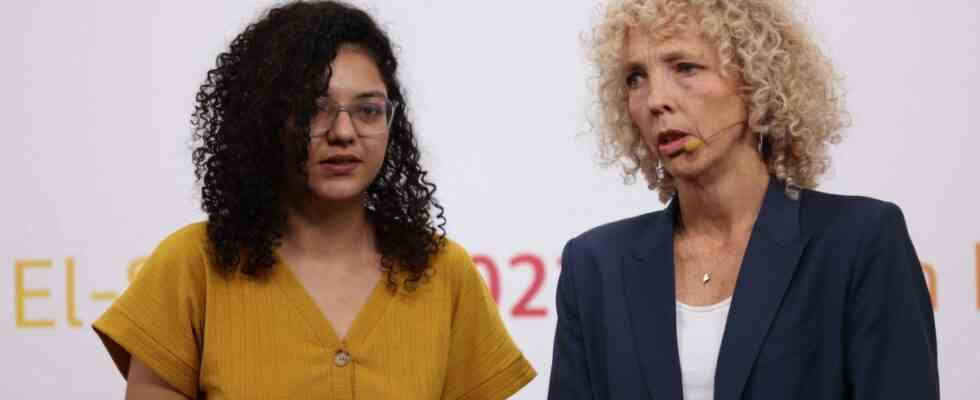The German Pavilion in Hall A of the International Conference Center is packed on Tuesday evening. Men with small and large cameras push through the crowd to take pictures of the event. On the podium is Jennifer Morgan, State Secretary of the Federal Foreign Office and representative of the Federal Government. Next to her is Sanaa Seif, a young woman in an ocher dress. Her very presence here is a calculated dig at the Egyptian government.
Sanaa Seif is the sister of Alaa Abdel Fattah, probably the country’s most prominent prisoner at the moment. The 40-year-old regime opponent has been in prison for most of the past ten years, most recently because he shared a critical post on Facebook. He has been protesting against this in prison for more than 200 days with a partial hunger strike, and he hasn’t drunk since the start of the world climate conference last Sunday. He uses the eyes of the world public to draw attention to himself and risks his life.
Sanaa Seif flew to Sharm el-Sheikh from the UK. She is happy that the Germans are giving her the space to speak and that this might save her brother, she says. Her voice is often brittle, Sanaa Seif indicates that she is a little overwhelmed with the situation. She thanks the solidarity of many climate activists. A few representatives of the German Fridays for Future movement are present and demonstrate at the end of the event with #FreeAlaa t-shirts for the release of Fattah, although protests against individual countries are prohibited on the climate conference site.
Alaa Abdel Fattah in a 2019 photo. Abdel Fattah was a key figure during the Egyptian revolution in 2011.
(Photo: Nariman El Mofty/dpa)
Several heads of government have spoken to Egyptian President Abdel Fattah al-Sisi in recent days and have campaigned for Fattah’s release. Above all the British Prime Minister Rishi Shunak, because Fattah also has British citizenship. But Chancellor Olaf Scholz also addressed the issue. That’s why he turned to Al-Sisi, the SPD politician said on Tuesday, calling the situation “depressing”. Jennifer Morgan is clearer in the German pavilion: That must be decided now, Fattah’s release must be possible “so that Alaa can live”. So far, there has been no official reaction from the Egyptians.
There are said to be 60,000 political prisoners
Sanaa Seif had already given a press conference on Tuesday afternoon. When questions were allowed, an Egyptian MP took the microphone and accused Fattah of leading a foreign conspiracy against the Egyptian military. He was eventually escorted out of the room by security guards.
When it comes to human rights, Egypt is a difficult host of the 27th World Climate Conference. Around 60,000 people are said to be in prison for political reasons, and the regime that came to power in a military coup in 2014 is cracking down on those who think differently. Many are being held without trial and there are reports of torture in prisons.
In addition to representatives from Human Rights Watch and Amnesty International, Hossam Bahgat was also on the podium in the German pavilion on Tuesday evening. He is the managing director of the Egyptian human rights organization Initiative for Personal Rights and talks about how restrictively these have been restricted over the past ten years. He can practically no longer leave his office because people are afraid to speak to him. Not he, but often his interlocutors have been arrested in the past.
He hasn’t been allowed to leave the country for seven years, reports Bahgat, and his accounts have been blocked. For him, the world climate conference is the long-awaited opportunity to be able to speak publicly again. In doing so, he accepts the risk of having serious problems after the conference, when the world has left Sharm el-Sheikh. Nevertheless, his eyes are now on Egypt and he doesn’t want to miss this opportunity.
Sanaa Seif thanks the German delegation for the opportunity to speak publicly. She thanks Chancellor Scholz for his commitment. But she also has a critical message with her. “You really should review your foreign policy with the Egyptian government,” she says. Germany has been the number one arms supplier for Egypt in recent years.

